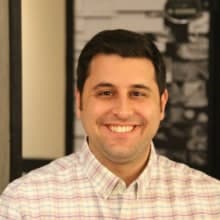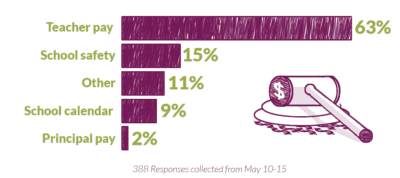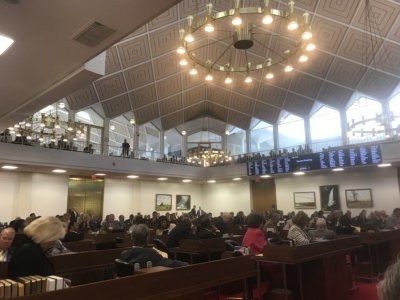It starts with a simple, yet audacious vision: One day, all children in our nation will have the opportunity to attain an excellent education.
This was the vision Wendy Kopp wrote about in her senior thesis at Princeton University more than 25 years ago. It is the mission a small cohort of new corps members first organized around in Rocky Mount, NC during the summer of 1991. That year, and every year proceeding it, corps members –which is what we call our 1st and 2nd year teachers—in Eastern North Carolina get up each day dedicated to their students and grounded in the belief that all students have incredible potential, though too many are denied opportunity along lines of race and class.
Our corps members can and do change this reality in their classrooms, but we also know that kids are raised in communities, not just in classrooms. The education system does not exist in isolation—it is impacted by different sectors and fields. From healthcare to housing, we know that there are many factors that shape the broader systems in which schools operate. And, while we know that the work that teachers do in their classrooms and with communities is vitally important, we also know it alone is not enough to change the broader system.
We all have a role to play to change this reality across these systems and deliver on the vision of an excellent education for all students here in Eastern North Carolina and throughout our state.
This year, we have corps members teaching in 67 schools across 12 counties in Eastern North Carolina. We have almost 250 alumni living and leading in rural counties and close to 700 other alumni in the Triangle. Our alumni base has more than doubled over the last five years. Since 1991, we have recruited, placed and supported almost 1,600 corps members in Eastern North Carolina and we continue to strive for a reimagined future where all children have access to an excellent and equitable education. Realizing this vision is directly tied to our collective future–it will determine if we have thriving rural communities in our area for generations to come.
Our approach to this work begins with a two-year commitment to teach in a high-need classroom. After, it continues through a life-long commitment to expanding opportunity and educational equity. At our best, our corps members and alumni, regardless of the sector they work in, collaborate with communities to build a vision for what they want to be true for students inside and outside the classroom, and then they execute that vision together.
For me, this work began as a corps member leading a fifth grade classroom in 2004. I recall vividly walking into an unfamiliar school as a young college graduate ready to teach and to lead. I was certain whatever learning lie ahead for my students applied just as much to me, as it did to them. I knew, and still know today, amazing teachers transform lives. All of us who enjoyed school remember that teacher, or hopefully those teachers, that made all the difference in life. I wanted to be that kind of role model and leader.
My time as a teacher was catalytic. I was able to see the faces of some of my fifth grade students on their high school graduation day and have experienced their excitement as I have made calls to congratulate them on their college graduation. Moments like this reaffirmed the idea that my time in the classroom did make a difference, and I knew that teachers across the country were experiencing these same moments, including many here in Eastern North Carolina. Our time in the classroom did change lives – moments like this showed us we were reimagining a system. But teachers and school leaders alone cannot change an education system that has remained largely unchanged for 100 years and was not designed to prepare all students for lifelong success.
How will we change the system?
Leadership at every level is the only way to address the systemic problems plaguing our current system. And let’s be honest, as much as I believe change is possible, I am realistic about the persistent problems we face in North Carolina.
Data tells us that only 57.8 percent of third graders in North Carolina scored proficient in reading last year. In some counties the percentage sinks as low as about 30 percent. Across our state, nearly half of our children (48.2 percent) live in poor or low-income households. In one county where we place corps members, that number jumps to more than 75 percent of children. These are serious, widespread issues. Social ills like this do not exist in isolation. Education is a system within a system. I do not pretend to have all the answers–no single person or group does–but we can all draw knowledge from a handful of lessons from enduring systems-change efforts throughout our history.
For corps members and alumni across North Carolina, these three truths drive our work: first, change requires sustained leadership inside and outside of the classrooms. It requires great teachers and school leaders but also leaders across sectors and fields challenging conventional wisdom and the status quo. Second, change requires a broad and diverse coalition of people. Perhaps today more than any other time in my lifetime, we need leaders to rally around common purpose, truths and possibilities, and shared values to drive progress. And third, the effort must be shaped by those most directly impacted by the injustice, and led by those with personal proximity to the inequity and its complexity.
How are we changing the system?
Currently, more than 160 corps members and almost 900 alumni across Eastern North Carolina are working to understand and address the various factors that contribute to our current education system. Our collective force of more than 1,000 leaders are reimagining a system grounded in education equity and justice. This network is a coalition of diverse, courageous leaders who build the leadership capacity of themselves and others to pursue meaningful change. This is not aspirational – this is what I’ve witnessed in communities such as the Triangle, Halifax, and Edgecombe. As we have seen more and more of our Teach For America alumni remain rooted here in Eastern North Carolina leading as veteran teachers, school and district leaders, social entrepreneurs, elected officials, lawyers and health care providers, we have witnessed them intentionally lead alongside students, families, fellow educators and other community leaders to build a shared vision for education equity in their communities and throughout our state. The coalitions are forming and our Teach For America corps members and alumni are critical a part of them.
I recognize the problem of educational inequity is deeply systemic and entrenched but as this network of leaders continues to grow and opportunities to accelerate impact increase, I know we can strengthen partnerships across lines of difference, learn from and with one another, and further build a broad and diverse coalition capable of leading enduring change aimed at reimagining an education system that provides all of our students with the education they deserve.
Across our communities, I have already seen countless people get involved, stay involved, and push for a better future in Eastern North Carolina. I have seen diverse, courageous leadership at every level and it makes me believe we are on the right path. Teach For America’s greatest contribution is, and has always been, the diverse, innovative network of leaders we bring to the education system and the state of North Carolina. These leaders work to expand opportunity for children from classrooms, to schools, to every sector and field that shapes the broader systems in which schools operate. But don’t just take my word for it.
Over the next few days, you’ll hear directly from Teach For America alumni and corps members, working from different sectors that impact education and remain rooted here in our communities throughout eastern North Carolina. It is through their work, in partnership with families and communities, that I believe a reimagined future is possible.





